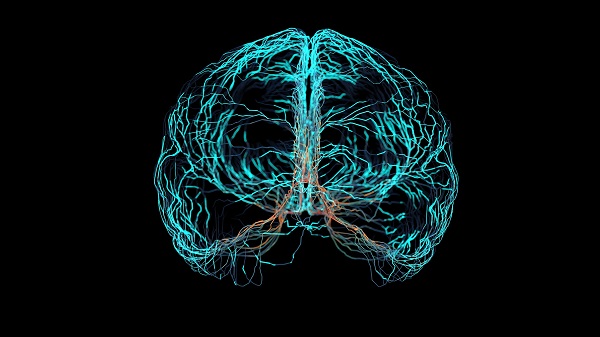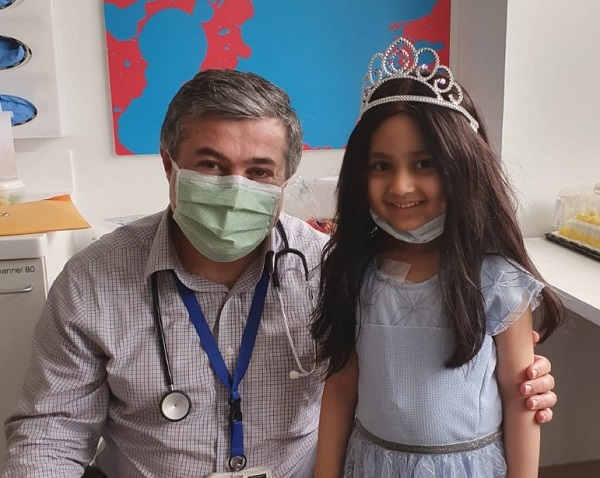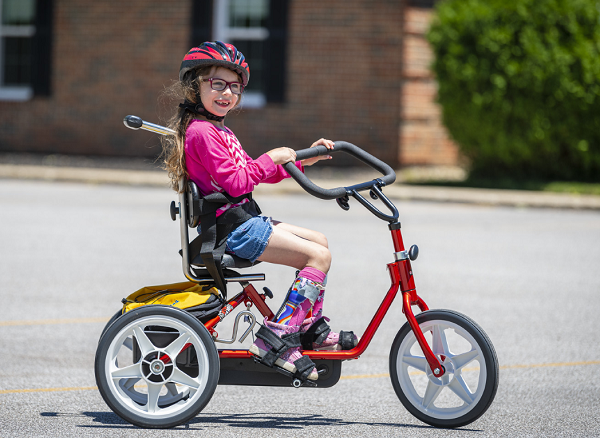Research Gets Us Closer to the Cause and Cure for Alzheimer’s Disease

Scientific discovery fascinates, inspires and gives us all hope. So, it’s not surprising that many Cleveland Clinic supporters choose to invest their philanthropic dollars in research – which is greatly appreciated by medical investigators like Lynn Bekris, PhD, associate staff at the Genomic Medicine Institute at Cleveland Clinic.
Dr. Bekris is the investigative lead in recent work published in the Journal of Immunology. Her team’s initial findings suggest anti-inflammatory treatment may help patients with Alzheimer’s disease (AD) when the disease is caught early enough.
“Alzheimer’s is a horrible, horrible disease and I’m completely driven to do something about it,” said the molecular biologist, whose mother died from complications of AD less than two years ago, just after Dr. Bekris and her lab team initiated the study.
Alzheimer’s disease, which is caused by the abnormal buildup of amyloid and tau proteins in the brain, is the sixth leading cause of death in the United States. Dr. Bekris and other scientists believe that disease occurs when amyloid protein builds up in the brain, forming plaques, and twisted fibers of another protein called tau. These plaques and tangles block the communication between nerve cells, which prevents them from working as they should.
Dr. Bekris and her team were able to demonstrate, as others have also described, that TREM2, a protein present on the surface of cells circulating in the blood and in the brain – when cleaved to produce a soluble form, sTREM2 – is elevated in cerebrospinal fluid (the liquid found in the central nervous system) during the early stages of the disease. Novel findings by Dr. Bekris' team suggest that when sTREM2 is elevated in the early stages of Alzheimer's disease, there is a broad change in circulating inflammatory factors, suggesting that targeting inflammation in the early stages may be a feasible treatment strategy in some cases.
“What we observed was a big change in the immune response in people with amyloid biomarkers, so we may have an early-stage biomarker of Alzheimer’s disease-related changes in the brain,” Dr. Bekris explained, noting that researchers use biochemical substances in our bodies called biomarkers to detect and measure disease. “This implies that changes in immune response occur very early in AD and we could potentially diagnose it and treat it, as we do, for example, multiple sclerosis. If we prevent the accumulation of amyloid, we may even be able to stop the disease. But, since there is a continuum of disease stages, treatment effect may vary, person to person. So, more study will need to be done to find the best disease stage and type of inflammation to treat.
“We still have a lot of work to do,” Dr. Bekris cautioned, “but the thing that is really encouraging about this inflammatory response many of us are observing now is that we can intervene. And even if it’s not the cause, but perhaps a flaring up of the disease or something that causes the disease to progress faster, we need to figure out why it’s happening so we can therapeutically target it.”
One of the biggest challenges, she said, is “as we make more and more advances in our understanding of disease and potential treatments and cures, the need for financial support to fill in funding gaps continues to grow.”
This study received generous support from the National Institute of Aging of the National Institutes of Health, Cleveland Clinic Center of Excellence Award Program, and the Jane and Lee Seidman Fund, but more was required. That’s where Dallas-based Aging Mind Foundation (AMF) – a funder of scientific research that seeks the cause of Alzheimer’s disease and other types of dementia – comes in.
AMF has a very narrow focus and awards only one grant each year, according to the foundation’s president, Dan Owen. Grant recipients must meet very specific criteria, he said, which the Bekris lab did “very well” in terms of helping to fulfill AMF’s mission and working in such a collaborative way.
“The results of this grant could support the involvement of inflammatory pathways as the cause of disease rather than consequence,” explained Rodger Kobes, MD, PhD, executive board member of AMF and chair of its grant committee. “With the aging of the Baby Boomers, Alzheimer's is going to inundate the healthcare system. We have to first find the cause of the disease and then the possible treatments.”
“It’s critical that we follow people over time, and those studies are very labor intensive and therefore very expensive,” added Dr. Bekris. “The Aging Mind Foundation award is helping us tease apart the when and why of immune system dysfunction in Alzheimer’s disease. And because of the foundation’s reputation, an award from them may serve as a catalyst to attract other donors.”
Lisa Shardon, who serves as vice president of AMF’s board, emphasized how helpful it was that Dr. Bekris took the time to visit Dallas and present at an AMF gala. “She also personally spoke to a lot of donors and members of our executive committee and was very, very effective. We appreciate that and can raise more funds because of it.”
In addition to funders, Dr. Bekris points out that her team depends on organizations like the Cleveland Alzheimer’s Disease Research Center (CADRC), where she leads the Biomarker Core. The CADRC is a collaborative, multi-institutional center led by Cleveland Clinic, Case Western Reserve University, University Hospitals, the Louis Stokes Cleveland VA, and MetroHealth.
“Alzheimer’s disease research is way behind cancer and we need to catch up,” said Dr. Bekris. “Cancer has multiple subtypes, which in the early days made it difficult to treat. But, with the advent of robust biomarkers, a more personalized medicine approach has advanced treatments for cancer. Alzheimer’s research is on the brink of this now. We’re starting to be able to detect subtypes. And that characterization helps us personalize treatments. To do this, we need really good biomarkers. I think we can do this. I think we’re almost there.”
Please note: Grace Weber, PhD, a former postdoctoral fellow in the Bekris lab, was first author on the study. Readers also may be interested to know that The Aging Mind Foundation publishes a fact sheet on Alzheimer’s and dementia on its website.
Children’s Global Fund Offers Hope to UAE Family

Elenna Hanna was four years old when her family brought her to Cleveland Clinic Children’s in 2019. Elenna had leukemia. Her family had no hope.
Her father, Hossam Hanna, is an ICU physician in the United Arab Emirates, but his daughter’s illness was so persistent that he needed more specialized care than he could find there. The Children’s Global Fund made it possible for the family to come to Cleveland.
“Cleveland Clinic gave us hope when we didn’t have any. We had lost hope after searching all over the globe to save her,” Hossam Hanna says.
They came to Rabi Hanna, MD, Chair of the Department of Pediatric Hematology, Oncology and Bone Marrow Transplantation at Cleveland Clinic Children’s, but no relation to the family. Since his appointment to Cleveland Clinic in 2010, Dr. Hanna has specialized in treating children with leukemia and solid tumors that require Hematopoietic Stem Cell Transplantation.
Elenna’s case was serious: She was admitted in August 2019 and received more than a year of treatment, including a bone marrow transplant from someone outside her family. She was discharged in November 2020. She is doing well now and returned for a wellness checkup in November 2021. The Children’s Global Fund paid for her care and the cost of the family stays.
Hossam Hanna says, “I am truly impressed and very grateful for the tender loving care and professional manner which Dr. Rabi Hanna and his team gave to my daughter. My family was made to feel comfortable and welcome. They brought blessing to our life by saving our daughter.”
Dr. Rabi Hanna says, “There is nothing more rewarding in medicine than saving the life of a child and making an impact not only on her but the whole family.”
Support of this program allows families to focus on caring for their child, not questions of financial resources. You can help provide care to children who require specialized treatment offered at Cleveland Clinic, and priority is given to families in need from war-torn and developing countries. Make a gift here.
Supporting a Healthy Start for Children on the Treasure Coast

Cleveland Clinic Martin Health established the Capen Fund for Kids in 1996 to assist children and their families in Martin County who are uninsured and unable to pay for medical and dental care.
This year, thanks to a generous donation from the Morgridge Family Foundation, the program will be expanding to St. Lucie County to reach more children in need. As the number of families in Martin and St. Lucie County continues to grow, support from the community is more important than ever.
Founded in 2008 by Carrie and John Morgridge, who serve as President and Vice President, the Morgridge Family Foundation has given more than $126 million to causes around the world, investing in organizations that reimagine solutions to some of today’s biggest challenges.
One of the Foundation’s core values is the belief in giving locally. As residents of the Treasure Coast, the Morgridges designated a gift to the Capen Fund for Kids to bring necessary resources to families in need, especially those who can’t afford medical care. The couple believes that inability to pay should not prevent families from receiving life-saving medical care.
The Morgridges also directed a gift this year to purchase a Pediatric HAL for the Simulation Center at Cleveland Clinic Martin Health. Coming soon to the Sim Center, the Pediatric HAL is the world's most advanced pediatric patient simulator and the first capable of simulating lifelike emotions through dynamic facial expressions, movement, and speech. It is designed to help providers of all levels develop the specialized skills needed to effectively communicate, diagnose and treat young patients in nearly all clinical areas.
“We're thrilled to give to an organization right in our own backyard that makes such a big difference in the lives of children and families,” says Carrie. "This gift will help ensure that more people receive the medical care they need without financial distress."
Since 2017, the Capen Fund for Kids has assisted 132 children and families and has given more than $150,000 to families in need.
How You Can Help
The Capen Fund for Kids supports children when they need it the most—from routine medical and dental to life-saving care. Your gift will help promote a future where all children have access to the medical care they require to have a healthy start in life. Please visit our website to make a gift.
Building Confidence and Strength, One Pedal at a Time

The therapy team at Cleveland Clinic Children’s Outpatient Therapy Services relies on an extensive toolbox to help patients increase function, including adaptive tricycles. The adaptive tricycles are operated by hand, foot or a combination of the two, depending on the patient’s requirements.
“Adaptive tricycles provide children with special needs a way to strengthen their lower and upper extremities, explore their environment and participate in an activity that is beneficial for all children,” says Nathan Ogonek, PT, DPT.
Recognizing the holistic benefits for children with a range of chronic conditions and serious injuries, Dr. Ogonek launched the Chance to Tryke program to provide adaptive tricycles for patients to use at home.
“These tricycles can be a financial burden for parents as they range from $500 to nearly $2,000, depending on adaptations that are needed to accommodate a patient’s postural needs,” says Dr. Ogonek.
In January 2022, Dr. Ogonek received a Caregiver Catalyst Grant from the Cleveland Clinic Philanthropy Institute to purchase 29 adaptive tricycles for patients.
Caregiver Catalyst Grants
Funded entirely through philanthropy, Caregiver Catalyst Grants provide vital seed funding to try new ideas and prove new concepts and approaches. 100% of donations go directly toward Cleveland Clinic employees' brightest ideas and innovations—ideas like Dr. Ogonek’s. Gifts are quickly put into action and support the entire cycle of ideas, from innovations to outcomes. The more money raised now, the more ideas that can become a reality.
All contributions to the Caregiver Catalyst Grants are combined and awarded to help advance caregivers' ideas. Twice a year, caregivers from all across Cleveland Clinic are invited to apply for Caregiver Catalyst Grants. Through a competitive process, these one-time grants are awarded to the project proposals that show the most promise for making an impact within one year. Caregivers must report on their progress and return any unused funds.
Getting Tricycles into the Hands – and Feet – of Patients
Physical therapists, occupational therapists and speech therapists at Cleveland Clinic Children’s can complete an application, created by Dr. Ogonek, to request a tricycle for a patient. The application asks for a summary of how the patient would benefit from using an adaptive tricycle, as well as detailed measurements to fit them with the right equipment.
“The hope is to get these tricycles to kids who would benefit from them, but are unable to purchase one,” says Dr. Ogonek. “So, there aren’t specific criteria. The program is open to any patient receiving services in our department.”
Gaining Skills and Confidence
As a staff pediatrician with Cleveland Clinic Children’s Department of Community Pediatrics, Eva Kubiczek-Love, MD, has a lot of complex care patients and patients with autism who require physical and occupational therapy. She is excited by the Chance to Tryke program’s potential.
“Every healthcare provider’s goal is to have each patient, no matter what underlying conditions they may have, strive to be the best they can be and gain as much independence as possible,” says Dr. Kubiczek-Love. “These tricycles could help my patients ambulate, relieve pain and accomplish milestones.”
Several of her patients plateaued developmentally during the COVID-19 pandemic when some services were put on hold or delayed. Adaptive tricycles could help them regain and improve function.
Dr. Ogonek has witnessed the impact first-hand in his practice. One of his patients with Down syndrome began using a foot-and-hand operated adaptive tricycle during physical therapy and has since graduated to a foot tricycle.
“He learned how to move the trike, which has a reciprocal pattern similar to that used during ambulation,” says Dr. Ogonek. “Now he is more confident moving and going through other activities.”
Turning Dreams into Reality
Dr. Ogonek recently hosted a build-a-bike day, joined by work colleagues, volunteers and even his parents, to assemble the tricycles and test them out. Soon, patients and their families arrived to pick up the new special three-wheelers. The children’s joy was overwhelming, as the tricycles gave them new freedom.
Dr. Ogonek hopes that patients will return the adaptive tricycles for others to use when they outgrow them or are done using them, allowing the Chance to Tryke program to reach even more families in need.
“Many of my patients see multiple subspecialists and require therapy services nearly every day, creating a fiscal burden,” says Dr. Kubiczek-Love. “This program allows access to something that is in the dream world for a lot of my families.”
That is just as important as the physical benefits, she adds.
“We look at our patients holistically, with compassion and empathy, not just as a set of nerves and muscles,” says Dr. Kubiczek-Love. “This program addresses their conditions but moves beyond that. It sends the message that the unreachable is reachable.”
How You Can Help
The number of Caregiver Catalyst Grants awarded is limited only by the philanthropic support we receive from generous donors across the country. Please make a gift today and help make a difference for our patients and their families.

